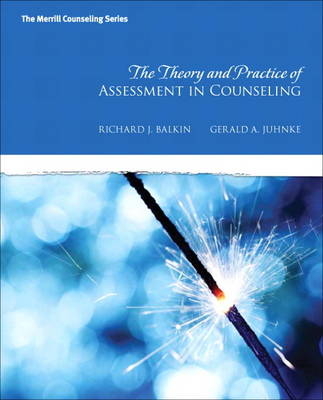
The Theory and Practice of Assessment in Counseling
Pearson (Verlag)
978-0-13-701751-5 (ISBN)
- Titel ist leider vergriffen;
keine Neuauflage - Artikel merken
Richard S. Balkin, Ph.D., LPC is an associate professor and Addictions Program Coordinator for the Department of Counseling and Educational Psychology at Texas A&M University-Corpus Christi. He is a Past President of the Association for Assessment in Counseling and Education, a division of the American Counseling Association. Dr. Balkin is Editor of the Journal of Counseling & Development, the flagship journal for the American Counseling Association, and a former Editor of Measurement and Evaluation in Counseling and Development and Counseling and Values, Journal of Professional Counseling: Practice, Theory, and Research. He has received counseling awards including the 2011 Counseling Vision and Innovation Award by the Association for Counselor Education and Supervision in recognition for his development of online resources and tutorials for teaching students assessment, measurement, and research, and the 2012 Best Practices Research Award by the American Counseling Association. Dr. Balkin’s clinical and research experience span over 20 years and encompasses over 30 refereed journal articles, and 9 book chapters or refereed proceedings, many of which are related to assessment, research methods, and statistics. Additionally, Dr. Balkin has authored or co-authored the Goal Attainment Scale of Stabilization (Mind Garden, Inc.), the Forgiveness Reconciliation Inventory, and the Juhnke-Balkin Life Balance Inventory. Gerald A. Juhnke, Ed.D. is a Professor and former Doctoral Program Director in the Department of Counseling at The University of Texas at San Antonio. He is a Past President of two professional counseling associations, The Association for Assessment in Counseling and The International Association for Addictions and Offender Counseling. Dr. Juhnke is a former Editor and Chief of The Journal of Addictions and Offender Counseling and a former Co-Chair of the American Counseling Association’s Council of Journal Editors. He has received numerous counseling awards including the 2009 American Counseling Association’s Fellow Award, the 2008 International Association for Addictions and Offender Counseling Addictions/Offender Educator Excellence Award, the Journal of Addictions and Offender Counseling Research Award, and the American Counseling Association’s Ralph F. Berdie Research Award. Dr. Juhnke’s clinical and research experiences span 25-plus years, and include the intertwined professional topic of “life-threatening behaviors” that encompasses suicide, violence, addictions, and trauma. During that time, he has authored more than 45 international or national refereed journal articles, and eight published or in-press books. Dr. Juhnke’s best-selling counseling textbooks include: Suicide, Self-injury, and Violence in the Schools: Assessment, Prevention, and Intervention Strategies (Wiley & Sons, 2010); Counseling Addicted Families: An Integrated Assessment and Treatment (Brunner-Routledge, 2006); and Substance Abuse Assessment and Diagnosis (Brunner-Routledge, 2002). Additionally, Juhnke’s co-edited book, Case Studies in Suicide: Experiences of Mental Health Professionals (Merrill-Pearson, 2009) and his first violence response textbook for counselors, Addressing School Violence: Practical Strategies, and Interventions, have received favorable reviews by mental health clinicians from various professions. Dr. Juhnke has also authored or co-authored several assessment instruments including the Juhnke-Balkin Life Balance Inventory; the Juhnke, Henderson, Juhnke, Child Abuse and Neglect Risk Assessment Scale; the Homework Identification Plan; the VIOLENTSTUdent Scale; the DANGERTOME Personal Risk Assessment Scale; the Adapted – SAD PERSONS Suicide Assessment Scale; the SCATTT Suicide Response Instrument; and the SUBSTANCE-Q Adolescent Substance Abuse Instrument. One of his recent instruments, EL SUICIDIO, written in Spanish, is a suicide assessment scale with correlating clinical guidelines specifically created for Mexican school counselors assessing Mexican students’ potential suicide risk.
TABLE OF CONTENTS
Chapter 1 THE ROLE OF ASSESSMENT IN COUNSELING 1
What Is Assessment? 1
History of Assessment 2
The Development of Counselors as Assessment
Professionals 6
The Association for Assessment in Counseling and
Education (AACE) 6
The ACA Code of Ethics (2005) 7
Fair Access to Tests 8
Test Publisher Qualifications of Test Users 9
Legal Issues 9
Health Care Legislation 9
Civil Rights Legislation 10
Educational Legislation 10
An Overview of Assessment in Mental Health Settings,
Schools, Rehabilitation Counseling, and Higher Education
Settings 11
Chapter 2 CASE STUDIES AND PROGRESS NOTES 13
Overview 13
Case Studies 14
Case Study: Ms. Eva Marie Garza 15
Case Study: Mr. Robert Jones 21
Progress Notes 27
Standardized Progress Note Formats 28
Discussion 34
Chapter 3 THE FUNDAMENTALS OF ASSESSMENT RESULTS 35
The Meanings of Test Scores 35
Criterion-Referenced Tests 35
Norm-Referenced Tests 36
Scales of Measurement 36
Understanding Assessment Scores: Frequency Distributions
and Percentiles 38
Measures of Central Tendency 41
The Mean 42
The Median 44
The Mode 44
What Is the Best Measure of Central Tendency? 44
Measures of Variability 45
The Range 46
The Standard Deviation and Variance 47
The Normal Curve 49
Confidence Intervals 50
Standard Scores 52
Z Scores 52
T Scores 52 Other Types of Standard Scores 53
Understanding Correlation Coefficients 53
Calculating a Person55
What Types of Scores are Reported 56
Chapter 4 CURRENT STANDARDS OF RELIABILITY 58
Defining Reliability 58
True Score 59
Error 60
Estimating Reliability 64
Reliability Coefficient 64
Types of Reliability Measurement 67
Consistency Over Time: Test-Retest Reliability 67
Estimates of Equivalency: Parallel or Alternate Forms 68
Internal Consistency 68
Interscorer Reliability 70
Interpretation of Reliability 70
What Are the Implications for Reliability? 72
Chapter 5 CURRENT STANDARDS FOR VALIDITY 74
Defining Validity: A Brief History 74
A Present View of Validity 76
Evidence Based on Test Content 76
How Is Evidence Based on Test Content Evaluated? 77
Evidence Based on Response Processes 78
How Is Evidence Based on Response Processes Evaluated? 78
Evidence Based on Internal Structure 78
How Is Evidence Based on Internal Structure Evaluated? 79
Evidence Based on Relations to Other Variables 80
How Is Evidence Based on Relations to Other Variables
Evaluated? 81
Evidence Based on Consequences of Testing 81
What Are the Implications for Test Validity? 82
Chapter 6 HOW TO CHOOSE AN ASSESSMENT INSTRUMENT 84
Defining the Purpose of the Assessment Instrument 84
Reviewing Assessment Instruments 87
Details of a Mental Measurements Review 88
AACE Critiques 90
Understanding the Technical Quality of an Instrument 91
Evaluating the Normative Sample 91
Evaluating Reliability Evidence of an Instrument 92
Evaluating Validity Evidence of an Instrument 93
Understanding Factors That May Affect Performance 94
Factors in Criterion-Referenced Tests: The Item Analysis 95
Item Difficulty 95
Item Discrimination 95
Review of the Assessments in This Text 96
Chapter 7 CONDUCTING AN INITIAL INTERVIEW 98
Purposes of the Initial Interview 98
Scope of the Initial Interview 99
Essential Elements of a Psychosocial History 101
Determining Mental Status 103
Factors Affecting Mental Status 106
Types of Intake Data 106
Substance Abuse/Abuse Intake 107
Applying Counseling Skills to the Interview Process 108
Types of Information Derived From Our Case Studies 109
Summary 111
Chapter 8 MULTICULTURAL AND SPECIAL POPULATION
ASSESSMENT ISSUES IN COUNSELING 113
Bias in Assessment 113
The Achievement Gap: An Heuristic Example of Test
Bias Versus Test Fairness 115
Assessment With Special Populations 116
Comparing Special Populations to Normative Samples 117
Adapting Assessment Instruments and Procedures 118
Developing Multicultural Competence as an Assessment
Professional 120
Awareness of Perceptions of Counseling and Assessment
Among Various Cultures 121
Case Study Application: Eva Marie Garza 123
Chapter 9 FUNDAMENTALS OF INTELLIGENCE ASSESSMENT 125
Defining Intelligence: Theories and Models 125
g Theory 126 Hierarchical Models 127
Contemporary Models of Intelligence 128
Emotional Intelligence 129
Three Common Intelligence Measures 130
WAIS-IV 132
SB5 133
KBIT-2 133
Types of Information Derived From Our Case Study
With Eva Marie 135
Chapter 10 FUNDAMENTALS OF ACHIEVEMENT AND APTITUDE
ASSESSMENT: ISSUES OF ABILITY 138
The Context of Achievement and Aptitude Testing 138
Defining Achievement and Aptitude Testing 139
Characteristics of Achievement Instruments 140
Teacher-Created Examinations 141
Types of Ability Testing 144
Common Characteristics in Ability Assessment Instruments 145
What to Report 146
Group-Administered Ability Assessment 149
High-Stakes Testing 149
Common Group-Administered Ability Assessments 150
Types of Information Derived From Our Case Study
With Eva Marie 152
Chapter 11 THE THE MULTIAXIAL SYSTEM, COMMON AXIS I AND II
DISORDERS, AND THE MMPI AND MMPI-2-RF 155
Overview 155
The DSM 156
Potential DSM Benefits 156
The DSM Multiaxial Assessment 157
The MMPI-2 and MMPI-2-RF: Why Describe the MMPI-2 and
MMP-2-RF? 160
General MMPI-2 Overview 160
MMPI-2 Reliability and Validity 161
MMPI-2 Scales 161
Validity and Clinical Scales 161
Clinical Scales 163
Code Types 166
PSY-5 and Supplementary Scales 167
Restructured Clinical Scales 168
Robert's MMPI-2 Profile 168
General MMPI-2-RF Overview 172
MMPI-2-RF Reliability and Validity 173
MMPI-2-RF Scales 173
Eva Marie's MMPI-2-RF Profile 174
Higher Order Scales 175
Restructured Clinical Scales 176
PSY-5 178
Internalizing, Externalizing, and Interpersonal Scales 178
Discussion 181
Chapter 12 FUNDAMENTALS OF CAREER ASSESSMENT 183
What Is Career Assessment? 183
Elements of Career Assessment 184
Interests and Personality 185
Values 188
Issues in Computerized Career Assessment 190
Types of Information Derived From Our Case Study
With Eva Marie Garza 191
Chapter 13 MARRIAGE, SUBSTANCE ABUSE, AND SUICIDE
ASSESSMENT 195
Overview 195
Marital Satisfaction Inventory-Revised (MSI-R) 196
General MSI-R Overview 196
MSI-R Reliability and Validity 196
Scales 197
Eva Marie's MSI-R 199
Validity Scores 199
Substance Abuse Subtle Screening Inventory-3 202
General SASSI-3 Overview 203
SASSI-3 Reliability and Validity 203
Scales 203
Robert's SASSI-3 205
Validity Scores 206
Clinical Scores 206
Alcohol Use Inventory (AUI) 206
General AUI Overview 207
AUI Reliability and Validity 207
Validity Scales 207
Clinical Scales 208
Robert's AUI 208
Validity Scores 211
Clinical Scores 211
Suicide Probability Scale (SPS) 212
General SPS Overview 212
SPS Reliability and Validity 212
Validity Scales 213
Clinical Scales 214
Eva's SPS 215
The Suicide SCATTT Mnemonic 217
General SCATTT Overview 217
Validity Scales 217
Eva Marie's SCATTT 220
Discussion 223
Chapter 14 FUNDAMENTALS OF INTERPRETATION IN
ASSESSMENT 225 Developing a Written Report 225
Reporting Scores for Standardized Instruments 226
Writing in Professional Language 230
Making Recommendations 231
Conducting an Interpretation Session With a Client 233
Reviewing Informed Consent Procedures 233
Reviewing the Instruments Used 234
Summarizing the Data in Client Language 234
Types of Information Derived From Our Case Study 235
Chapter 15 ACCOUNTABILITY ISSUES IN COUNSELING AND
ASSESSMENT 238
Counseling in an Era of Accountability 238
Barriers to Assessing Accountability in Counseling 240
Nonstandardized and Standardized Assessment
of Accountability 242
Nonstandardized Assessment-Goal Attainment Scaling 243
Standardized Assessment 245
Evaluating Client Progress and Improvement 247
Applying Goal Attainment Scaling to Eva Marie 248
Going Beyond the Client: Using Assessment in Program
Evaluation 250
Appendix A Area Under the Normal Curve 253
Appendix B Competencies in Assessment and Evaluation for School
Counselors 256
Appendix C Standards for Assessment in Mental Health Counseling 259
Appendix D Standards for Assessment in Substance Abuse Counseling 263
Appendix E Marriage, Couple and Family Counseling Assessment
Competencies 266
Appendix F Career Counselor Assessment and Evaluation Competencies 269
Appendix G Rights and Responsibilities of Test Takers: Guidelines and
Expectations Preamble 272
Appendix H Responsibilities of Users of Standardized Tests (RUST) 279
Appendix I Standards for Multicultural Assessment (2 nd Ed.) 284
Index 292
| Erscheint lt. Verlag | 18.3.2013 |
|---|---|
| Sprache | englisch |
| Maße | 187 x 232 mm |
| Gewicht | 789 g |
| Themenwelt | Geisteswissenschaften ► Psychologie ► Test in der Psychologie |
| Sozialwissenschaften ► Pädagogik ► Sozialpädagogik | |
| Sozialwissenschaften ► Soziologie | |
| ISBN-10 | 0-13-701751-0 / 0137017510 |
| ISBN-13 | 978-0-13-701751-5 / 9780137017515 |
| Zustand | Neuware |
| Haben Sie eine Frage zum Produkt? |
aus dem Bereich


